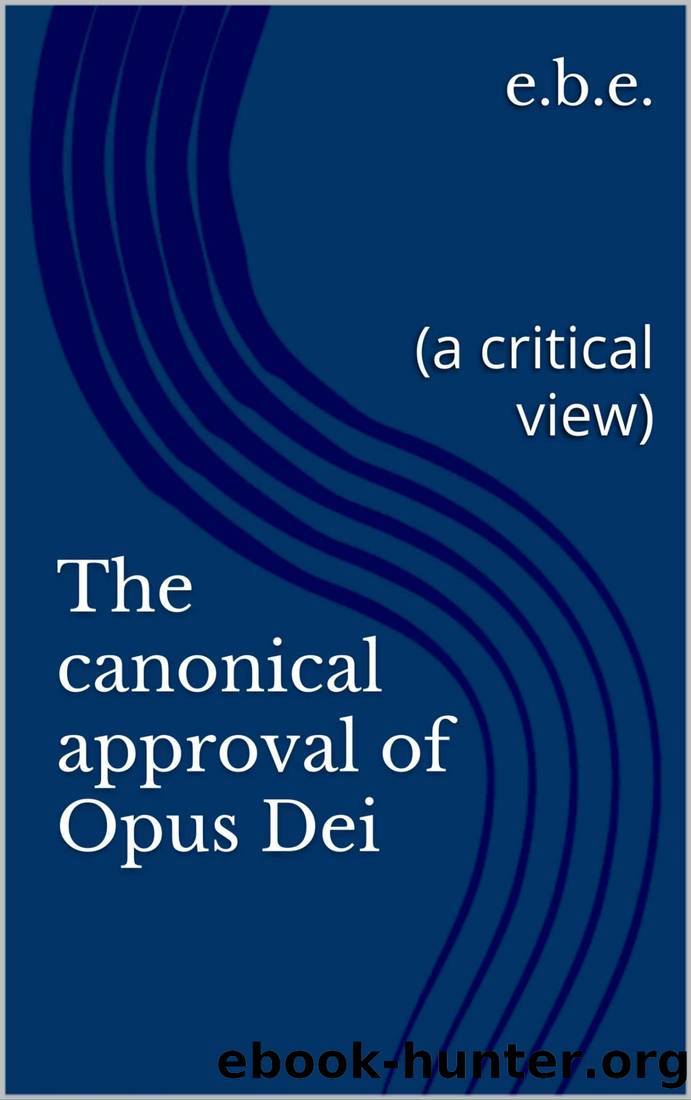The canonical approval of Opus Dei by Ebe

Author:Ebe
Language: eng
Format: mobi
***
The personal prelature, 1982
After rejecting the secular institute status, in spite of apparently being the “the full sanction of our supernatural path by the Magisterium of the Church”[113], Escrivá started looking for a new juridical status until getting into the Promised Land, as the founder liked to say[114]. Although the secular institute was initially that land, later it changed and the personal prelate was declared the new promise. Let us say it clearly: it is not a small “geographical” error to be wrong about where the Promised Land is. Moreover, we should ask if the personal prelature was the definitive canonical status. That is what Alvaro del Portillo stated in an interview published by ABC of Madrid newspaper:
«Fortunately, in December 1980, the Pontifical Commission for reviewing the Code of Canon Law (...) said that the expression “cum proprio populo” had been suppressed from the canon projects, since, for various technical reasons, that expression was inconvenient. Naturally —I would say, with satisfaction— we accommodated ourselves to that precise juridical norm, without any need for changing the content of our request: the same as the Holy See has, definitively sanctioned now.»[115]
It would be interesting to learn what those “technical reasons” were, but Del Portillo did not say anything about it. The other question is why he used the word “accommodate” (to adapt) if —as he said— Opus Dei’s request and Holy See’s approval had the same content. Why should Opus Dei adapt to the suppressed “cum proprio populo” expression? There seems to be a contradiction in what Del Portillo says in that paragraph.
According to Rocca’s studies, it is easy to understand why Opus Dei had to accommodate to what Holy See sanctioned: the approved status was not the status sought by Opus Dei: a personal prelature “with its own people” (cum proprio populo)[116].
«Alvaro del Portillo requested [1979] the transformation [of Opus Dei] into personal prelature “cum proprio populo”, instead of prelature nullius as Mission of France [1962]. That was possible thanks to the Second Vatican Council, which created the personal prelatures for specific apostolic aims. Therefore, it was not necessary a territory (neither a privilege) like in Escrivá’s request [prelature nullius, 1962]; but the “cum proprio populo” requirements were still asked for. Opus Dei was presented as a jurisdictional structure with its own people, similar to a diocese, but instead of being a local Church, it was a personal Church. In this sense, Opus Dei would have had jurisdiction over its own faithful —and the diocesan authority would have been pushed back— with a continuous growth by increasing proselytism.»[117]
One more time, Opus Dei seems to have not reached the Promised Land. This would be the third unsuccessful attempt. However, what it is most important is Escrivá’s unsuccessful effort to answer the question “Could I have deceived so many souls?” because Opus Dei did not get the appropriate canonical sanction, which should be necessary to prove their supernatural character[118].
«In this sense I should like to clarify the following error: it was said, and
Download
This site does not store any files on its server. We only index and link to content provided by other sites. Please contact the content providers to delete copyright contents if any and email us, we'll remove relevant links or contents immediately.
Resisting Happiness by Matthew Kelly(3341)
The Social Psychology of Inequality by Unknown(3031)
Day by Elie Wiesel(2786)
Designing Your Life by Bill Burnett(2748)
The Giving Tree by Shel Silverstein(2345)
Human Design by Chetan Parkyn(2075)
The Supreme Gift by Paulo Coelho(1979)
Angels of God: The Bible, the Church and the Heavenly Hosts by Mike Aquilina(1969)
Jesus of Nazareth by Joseph Ratzinger(1811)
Hostage to the Devil by Malachi Martin(1803)
Augustine: Conversions to Confessions by Robin Lane Fox(1774)
7 Secrets of Divine Mercy by Vinny Flynn(1746)
Dark Mysteries of the Vatican by H. Paul Jeffers(1723)
The Vatican Pimpernel by Brian Fleming(1703)
St. Thomas Aquinas by G. K. Chesterton(1635)
Saints & Angels by Doreen Virtue(1606)
The Ratline by Philippe Sands(1580)
My Daily Catholic Bible, NABRE by Thigpen Edited by Dr. Paul(1503)
Called to Life by Jacques Philippe(1481)
